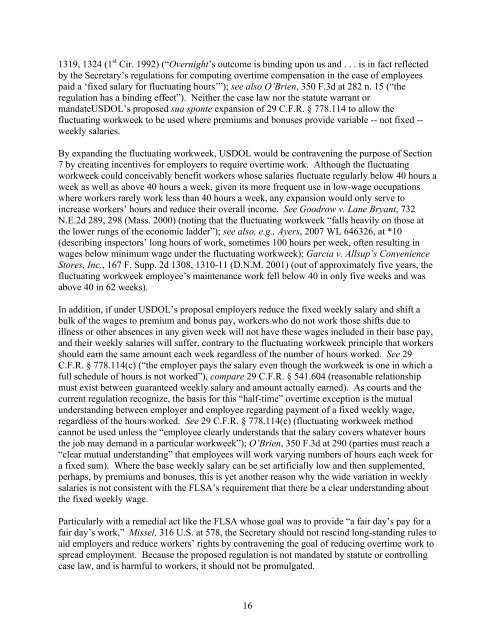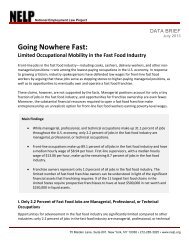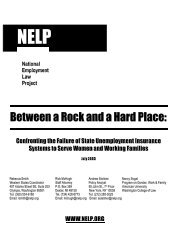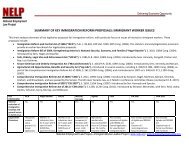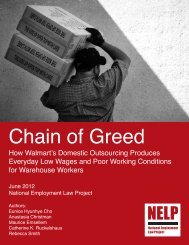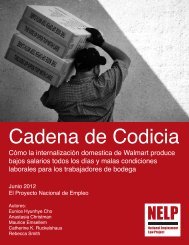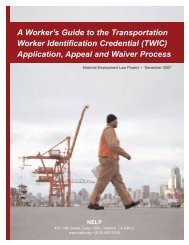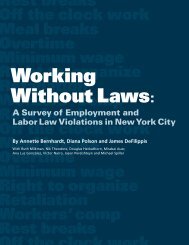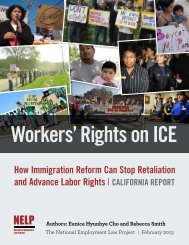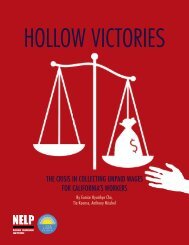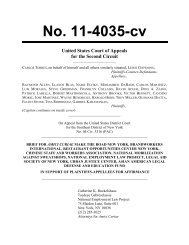National Employment Law Project
National Employment Law Project
National Employment Law Project
Create successful ePaper yourself
Turn your PDF publications into a flip-book with our unique Google optimized e-Paper software.
1319, 1324 (1 st Cir. 1992) (“Overnight’s outcome is binding upon us and . . . is in fact reflected<br />
by the Secretary’s regulations for computing overtime compensation in the case of employees<br />
paid a ‘fixed salary for fluctuating hours’”); see also O’Brien, 350 F.3d at 282 n. 15 (“the<br />
regulation has a binding effect”). Neither the case law nor the statute warrant or<br />
mandateUSDOL’s proposed sua sponte expansion of 29 C.F.R. § 778.114 to allow the<br />
fluctuating workweek to be used where premiums and bonuses provide variable -- not fixed --<br />
weekly salaries.<br />
By expanding the fluctuating workweek, USDOL would be contravening the purpose of Section<br />
7 by creating incentives for employers to require overtime work. Although the fluctuating<br />
workweek could conceivably benefit workers whose salaries fluctuate regularly below 40 hours a<br />
week as well as above 40 hours a week, given its more frequent use in low-wage occupations<br />
where workers rarely work less than 40 hours a week, any expansion would only serve to<br />
increase workers’ hours and reduce their overall income. See Goodrow v. Lane Bryant, 732<br />
N.E.2d 289, 298 (Mass. 2000) (noting that the fluctuating workweek “falls heavily on those at<br />
the lower rungs of the economic ladder”); see also, e.g., Ayers, 2007 WL 646326, at *10<br />
(describing inspectors’ long hours of work, sometimes 100 hours per week, often resulting in<br />
wages below minimum wage under the fluctuating workweek); Garcia v. Allsup’s Convenience<br />
Stores, Inc., 167 F. Supp. 2d 1308, 1310-11 (D.N.M. 2001) (out of approximately five years, the<br />
fluctuating workweek employee’s maintenance work fell below 40 in only five weeks and was<br />
above 40 in 62 weeks).<br />
In addition, if under USDOL’s proposal employers reduce the fixed weekly salary and shift a<br />
bulk of the wages to premium and bonus pay, workers who do not work those shifts due to<br />
illness or other absences in any given week will not have these wages included in their base pay,<br />
and their weekly salaries will suffer, contrary to the fluctuating workweek principle that workers<br />
should earn the same amount each week regardless of the number of hours worked. See 29<br />
C.F.R. § 778.114(c) (“the employer pays the salary even though the workweek is one in which a<br />
full schedule of hours is not worked”), compare 29 C.F.R. § 541.604 (reasonable relationship<br />
must exist between guaranteed weekly salary and amount actually earned). As courts and the<br />
current regulation recognize, the basis for this “half-time” overtime exception is the mutual<br />
understanding between employer and employee regarding payment of a fixed weekly wage,<br />
regardless of the hours worked. See 29 C.F.R. § 778.114(c) (fluctuating workweek method<br />
cannot be used unless the “employee clearly understands that the salary covers whatever hours<br />
the job may demand in a particular workweek”); O’Brien, 350 F.3d at 290 (parties must reach a<br />
“clear mutual understanding” that employees will work varying numbers of hours each week for<br />
a fixed sum). Where the base weekly salary can be set artificially low and then supplemented,<br />
perhaps, by premiums and bonuses, this is yet another reason why the wide variation in weekly<br />
salaries is not consistent with the FLSA’s requirement that there be a clear understanding about<br />
the fixed weekly wage.<br />
Particularly with a remedial act like the FLSA whose goal was to provide “a fair day’s pay for a<br />
fair day’s work,” Missel, 316 U.S. at 578, the Secretary should not rescind long-standing rules to<br />
aid employers and reduce workers’ rights by contravening the goal of reducing overtime work to<br />
spread employment. Because the proposed regulation is not mandated by statute or controlling<br />
case law, and is harmful to workers, it should not be promulgated.<br />
16


